NGS’ Science Social Café Exposes Girls to Women in Science—Broadens Narrow Notions About Careers in Science
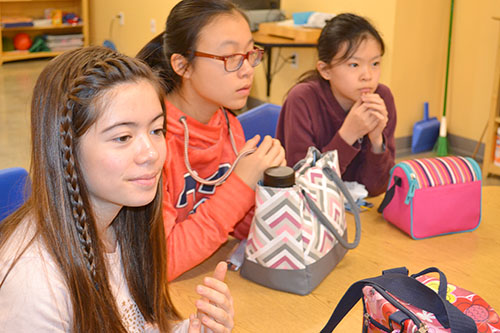
NGS students listen to Grace Gao present about her research in Aerospace Engineering during NGS' new Science Social Café.
March 30, 2018
Most Thursdays, eleven middle school girls from Next Generation School can be found at the school’s brand new Science Social Café Club, chatting over lunch with local women who are scientists. Besides learning about different potential careers, as the girls hear how these women got to where they are today, they’re also absorbing some pointers about discovering their own careers. Some key ideas they’ve learned are: 1) If you discover that you don’t really like what you originally planned to do, it’s ok to change your mind. 2) You can fashion a career out of some very disparate disciplines. 3) If there’s something you love and are passionate about, you just might be able to make a career out of it.
The goal of the club, which began in January, is to provide a relaxed environment where girls can chat with women in different fields of science. Instead of a formal presentation or something more focused, like a hands-on activity, the idea is for the girls to hear about how these women got into their expertise, what their research is or what their day looks like, then ask any questions they might have. Though the club started out with only four girls, excitement about the club quickly spread via word of mouth. Now eleven 6th through 8th grade girls are currently participating.
In charge of the program is Next Generation School’s STEAM Studio Director, Angela Nelson, who reports that they’re trying to offer the girls a mix of lots of different experiences. “One of my goals is to try and break the boundary of "you could be a doctor, an engineer, or a lawyer," she admits.
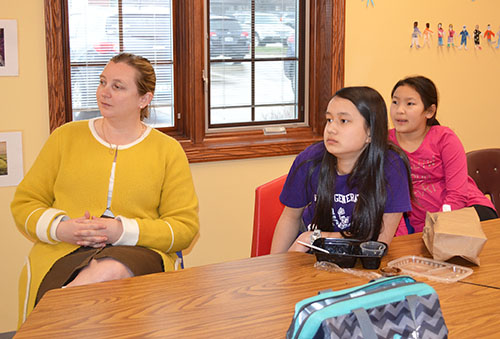
STEAM Studio Director Angela Nelson (left), and a couple of NGS student listen to Aerospace Engineering Professor Grace Gao as she presents.
Since neither Nelson, the presenters, nor any of the students had ever done anything like the club before, no one really knew what to expect.
So Nelson has just told the women who are going to present, "This is just an opportunity to have a conversation, and you take it where you would like to take it. The girls for sure want to hear about your research and what you're doing daily, because I think that's kind of part of this, to see all these different options that are out there.”
How’s it going so far? Great. Nelson says the girls have been “eating up the opportunity to talk science, really. It's amazing to listen to the types of conversations they're having. Evidently the first time, they were scared to ask questions and were raising their hands and waiting for the spots in the conversation. But that quickly changed, and now the girls feel confident enough to even interrupt and ask questions. “They're finally starting to make connections and feel comfortable enough to just go with it.”
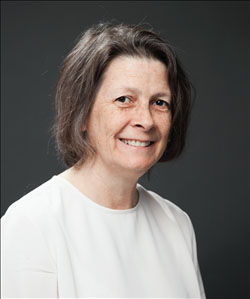
Professor Nicki Engeseth, Head, Department of Food Science and Human Nutrition.
Each woman who has presented has done things differently, ranging from using videos, to manipulatives, to just coming in and talking about her story.
“I want it to be authentic,” says Nelson, “and I want it to fit whoever the person is. It's meant to inspire the girls and just show that there's so many different ways to do it.”
First to present was Food Chemistry Professor Niki Engeseth, who shared about her research with chocolate and honey. But she also introduced the idea that it’s ok to change your mind career-wise. When she went to college, she was originally planning on going into medicine. But once she had taken some classes, Engeseth realized, “It just wasn't for her,” Nelson recalls, “and it was okay that it wasn't working for her. She ended up finding something else that she actually loved more.” So the girls learned that it’s ok to break out of the box, explore, and then find something that you love.
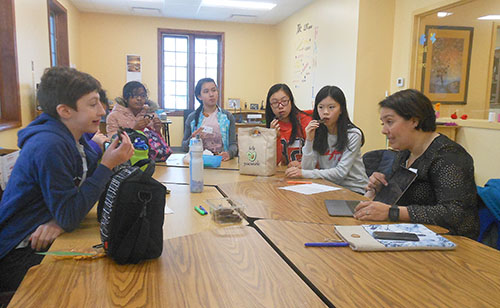
NGS middle school students listen to Mariana Kersh present. (Image courtesy of Angela Nelson.)
Another presenter, Mariana Kersh, an Assistant Professor in the Department of Mechanical Science and Engineering, exposed the students to her work with joints, and also communicated to them that they could craft a career out of very different disciplines. “They could be in engineering,” Nelson says, “but be working with animals and physically watching horses move on videos and taping that and everything else, and the girls never realized that they could be working veterinarians but be in engineering.”
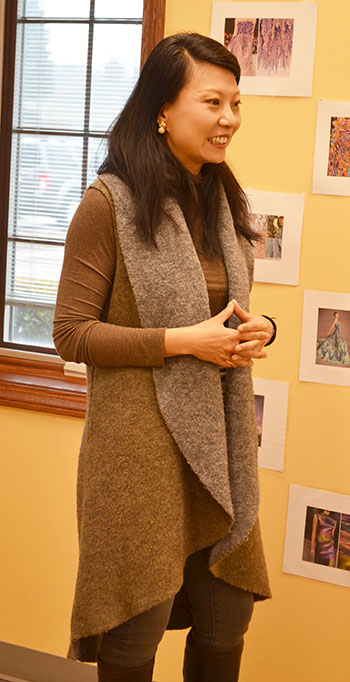
Aerospace Engineering's Grace Gao.
Sharing with the girls about her work with GPS and drones was Aerospace Engineering Assistant Professor Grace Gao. Passionate about increasing the number of women in STEM and especially in her field, Gao shared an anecdote about when she was an undergrad and one of the few women in studying her field and had felt it necessary to downplay the fact that she was female. To encourage the girls that things are changing in engineering, and that they can be engineers and still be girls, Gao shared with them a list of some of her many roles and interests, most of which are traditionally enjoyed by women.
Gao reports that she volunteered to present at the girls' club in order to "inspire girls and foster their interests in science and engineering." She adds that one of the benefits of the club is to "broaden their view of science and engineering by exposing the girls to various research fields."
Also slated to present later in the semester is Julia Whittington, a clinical assistant professor from the College of Veterinarian Medicine.
While a lot of the presenters made their career choices quite a while ago, Nelson also wanted to bring in some younger women still in the throes of decision making. She wanted the girls to meet women “still in the process of discovering where they're going to go, and what that feels like, and how they ended up where they are. So she scheduled some women from the MCBees, a Molecular and Cellular Biology Graduate Student Association, who not only shared their current research, what being an MCB graduate student is like, and their career plans, but also their path into science since childhood.
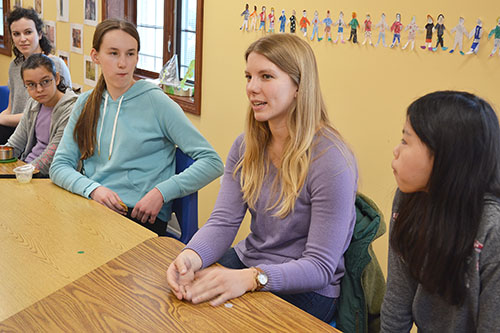
Above: NGS middle school students listen to Katie Frye (second from right) share during a Science Social Café visit by the MCBees.
Below: MCB PhD student Andie Liu shares her story with the NGS students.
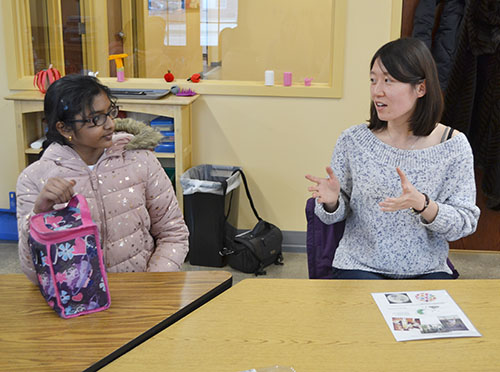
The club has actually ameliorated since its inception. Nelson originally was deciding what careers or fields the girls should learn about; however, once the middle schoolers discovered what the café was actually all about, they began suggesting different fields they’re interested in. They've gradually taken ownership regarding the topic areas, so now Nelson just looks for ladies in those fields to come and present.
What fields are they interested in? Evidently sleep was a biggie that they wanted to know more about, so Nelson scheduled someone to talk about their research on circadian rhythms. Plus, because Nelson is also bringing in people from the community who are not from the university and the research end of things, she contacted someone from the sleep clinic who will also be explaining what their job is. “They'll get to see different ways that sleep could be a profession,” Nelson explains.
Astronomy was another big one, along with environmental science. In fact, Nelson is pretty much set with topics the girls want to hear about up through next spring. She shares an epiphany the girls had on a recent walk back to the school from STEAM Studio.
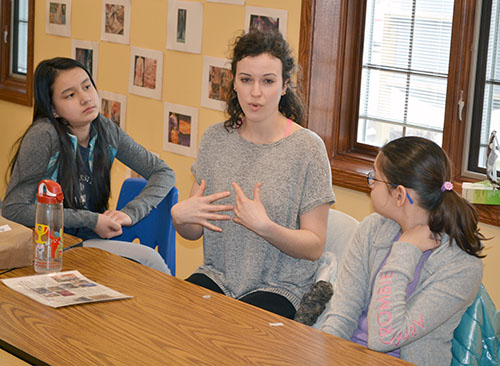
NGS middle school students listen to MCB Ph.D. student Mara Livezey (center) as she shares during the MCBees Science Social Café presentation.
“All of a sudden, that bubble burst. All of a sudden there was this list of verbal vomit with everything they would like to learn about. We're not going to fit any more in this year,” she admits, “but we'll try again for next year. We'll take that list and get it going.”
Lest the boys feel neglected, Nelson is planning an iteration for them too. This coming fall, there will be a Science Social Café for them, then it will alternate back to the girls again in the spring of 2019.
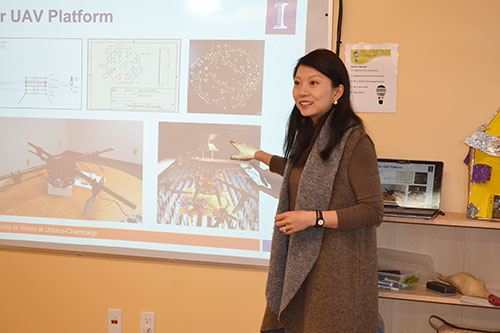
Assistant Professor Grace Gao presents about her research with UAVs.
So, why not do a co-ed café? According to Nelson, “There's research showing that if you do it in a mixed environment, girls are more apprehensive, especially once they get into middle school, to just jump in and ask questions. They're going to watch and observe and take it in, but they're not going to be like, ‘Hey, how about this or how about that?’ So we wanted to just take away that factor and make it more, "This is just a chat. You can talk about whatever you want with these ladies."
What Nelson has appreciated is that the girls are learning that for most of the women, discovering the career they’re passionate about has not always been a smooth process, but more trial and error.
“Girls are scared to fail,” Nelson admits. “They want it right the first time.” But Nelson says the club has kind of broken through that barrier a little bit, “because almost every person has come in and has talked about a story where ‘I was heading in this direction, and then I experienced this, and I went a different way’ or ‘I met this person, and it changed my view.’”
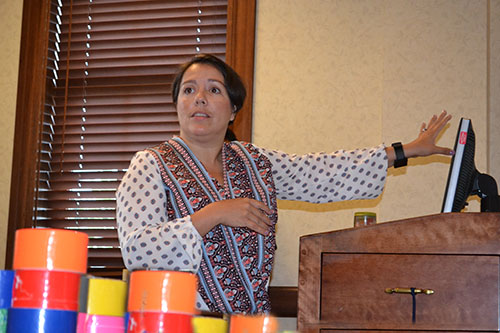
Mechanical Engineering Professor Mariana Kersh.
Take Mariana Kersh, who shared an anecdote about how she ended up in Engineering. When she was young, she loved building with IKEA. But she didn't want to be a mathematician or an engineer. ‘It didn't interest me, and that wasn't my thing,’ Kersh had reported. “She had no clue that she could work with animals and humans and be an engineer,” Nelson relates. “It's great for these girls to start to realize how many opportunities are out there, and you can take your passions anywhere.”
Nelson shares another anecdote about Kersh, who had asked the kids what they’d like to be when they grew up. One girl had responded, “I'm really torn because I love science, and I love art.” “She had in her head that you could only do one or the other,” says Nelson. “But then Kersh responded, ‘Have you ever thought of doing both? We need illustrators, and this is a job where you take science, and you make pictures out of it, and tell stories, and make videos.’ And she was mind blown.”
Where did the idea for the social café come from? Nelson reports reading an article by the National Science Teachers Association about a teacher who had done something similar, providing opportunities for either junior or senior high school girls. And it had grown, with more and more girls wanting to be a part. Then, because the boys wanted to do it too, they had gone a different direction and made it co-ed.
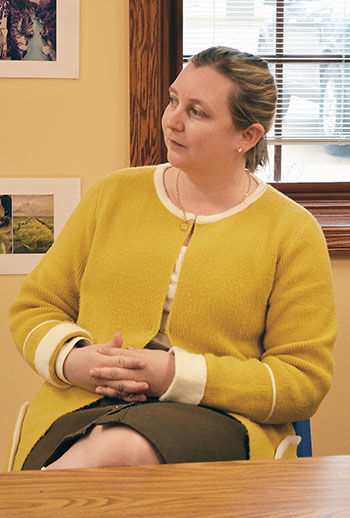
STEAM Studio Director Angela Nelson.
Nelson was sold, deciding a café club would give her the opportunity to provide services for the school’s 6th through 8th graders, because at present, STEAM Studio’s after-school programs are only for kindergarten through 5th grade.
“I thought this was a nice way to start to have middle school involvement at STEAM and give them a safe, comfortable environment that's only 40 minutes long; it's quick, and it's just like a taste.” So the middle school girls bring their lunches over to STEAM Studio and eat while listening to the story. As an extra incentive, Nelson confesses, “Usually I bring a snack or a dessert for them.”
Nelson shares why something like this important for middle school kids, especially girls.
“It's giving students a chance to move away from peer pressure and the norms of what they feel like they have to do and giving them a chance to just be comfortable and relaxed and get to experience lots of different opportunities.”
She’s also excited that the girls all take away something different from the program. According to Nelson, some are more intrigued with the story about how the presenter ended up where they are today. Others are more interested in looking at the science and finding out more about it, “getting that opportunity to just talk to people. It's a skill that everyone needs,” she admits. The girls also get to learn about all of these different topics that inspire them. “We're bringing in people that really love what they do and they're bringing that passion with them, giving those girls an opportunity to see that they could take their passions and go wherever they would like.”
Story and photographs by: Elizabeth Innes, Communications Specialist, I-STEM Education Initiative
More: 6-8 Outreach, MCBees, Next Generation School, STEAM Studio, Women in STEM, 2018
For more I-STEM articles about STEAM Studio and Next Generation School, please see the following:
- STEAM Studio Uses Science, Technology, and Art to Go “Virtually Spelunking” in Caves—Exploring Everything From Spiders to Bats to 3D Cave Painting to GPS
- Wai-Tat Fu's Lab Partners with STEAM Studio To Make STEM, Spatial Reasoning Fun
- STEAM STudio's STEAMcation Students Visit RailTEC...Learn All About Trains
- Illinois' MCBees Expose STEAM Studio's STEAMcation Students to Medieval Science
- Next Gen's STEAM Studio: An After-School STEM Program With a Dab of Creativity
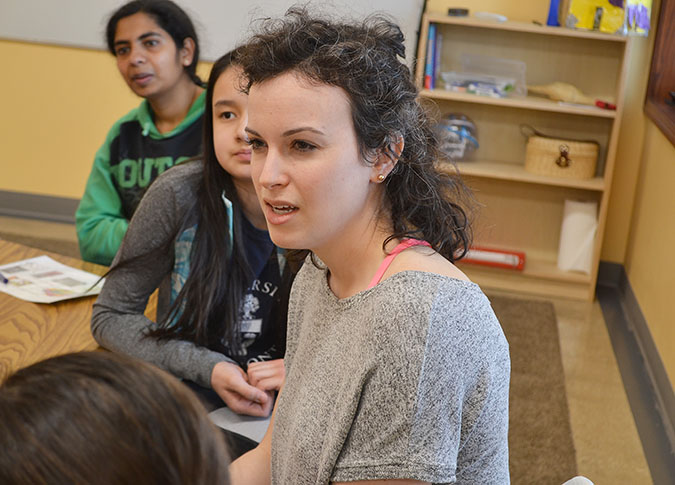
Mara Livezey interacts with the Science Social Café participants.













.jpg)
















